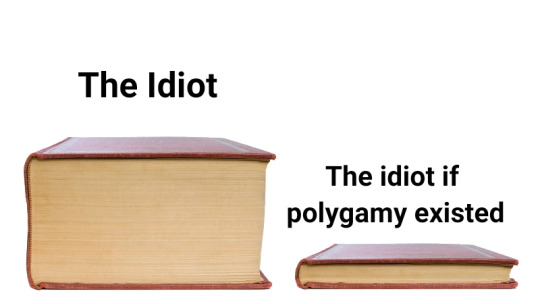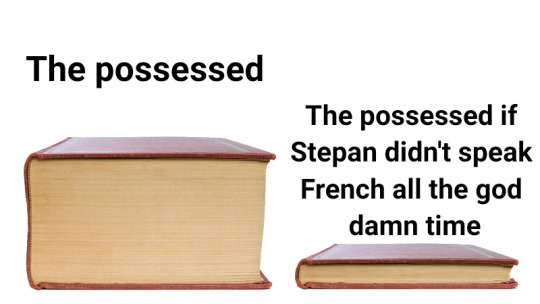#stepan trofimovitch
Text

Every male literature character core
#the idiot#1984#the possessed#nikolai stavrogin#prince myshkin#winston smith#kafka metamorphosis#metamorphosis#gregor samsa#parfyon rogozhin#a little though#stepan trofimovitch#theyre all so silly#and babygirl#love them#literature#russian literature#american literature#english literature#literature memes#classic#classics
112 notes
·
View notes
Text
"My prosaic friend," JUST KISS GOD DAMN
#stepan trofimovitch#varvara petrovna#varvara#the possessed#the devils#demons#devils#fyodor dostoevsky#dostoevksy#dostoyevski#dostoevsky
21 notes
·
View notes
Text
Demons Review
I've continued my Dostoevsky journey by reading Demons and I just finished it. Man, it was a ride. A good one but a ride nonetheless. The beginning, at least to me, was slow. Stepan Trofimovitch is so pathetic and I didn't find him that compelling.
It all changed when Stavrogin and Pyotr Stepanovitch showed up. Those two were so fascinating and mysterious. Their monologues were simply outstanding. Pyotr Stepanovitch is such a menace and every scene he was in kept me on the edge of my seat. The way he could needle into conversations and people's heads was so captivating. Stavrogin is also captivating as he finds himself at the center of many conversations. The chapter when he visits Tihon's was particularly fascinating. The confession, though deeply disturbing, really gives us a look into Stavrogin's psyche. He's an incredibly disturbed individual.
My favorite characters have to be Shatov and Kirillov. Shatov was one of the few characters that had a hopeful future. He tried to leave, he reconciled with his wife, and he was ecstatic about having being a father even though it wasn't his. Shatov isn't a genuinely bad person. In the events leading up to his death, I hoped he would able to escape last minute. But sadly, that wasn't the case. Kirillov was a truly fascinating character to me because of his beliefs. I've never met a character who sought their "self-will" through taking one's life. It's such a sad but interesting and complex idea. It gave me a lot to think about honestly. Kirillov himself is also a likable character like Shatov. I def will reread the book for those two. First, I need to read The Idiot though.
The end of the book was so exhilarating with characters dying left and right. It felt like as the characters and society spiraled further into chaos and despair, so did the book. I'm glad though that Shatov's murderers were brought to justice (minus the cockroach Pyotr Stepanovitch because of course he escapes).
This book reflects society as a whole. It's incredibly relevant even today and warns us agains the power of radical ideas. Ultimately, the biggest takeaway I had was that we all have Pyotr Stepanovitchs in our lives. What matters is if we choose to give into the chaos or choose a better path like Shatov (not that it worked out for him but he tried, ok?).
#fyodor dostoevsky#demons dostoevsky#pyotr verkhovensky#nikolay stavrogin#ivan shatov#alexey kirillov#stepan trofimovitch
12 notes
·
View notes
Text
As much as I like Demons, I still don’t understand Stepan Trofimovitch. Rereading chapter 1 has me constantly ask: ok that just happens; but like, why?
4 notes
·
View notes
Text
dostoevsky's demons? oh you mean three severely ill men and the worst human beings they ever met
12 notes
·
View notes
Text
Stepan Trofimovitch’s affirmation of the transcendental value of beauty precipitates a near riot. Yet across the course of the novel as a whole, we are enabled to see that not only is his aestheticism incapable of resisting the force of contemporary nihilism, but the difference between his aestheticism and the nihilists’ materialism is at times paper thin. With regard to the former, he is shown to be an entirely ineffectual man who is constantly vacillating, incapable of making decisions, living out a fictitious self-image that he uses to sponge off a patroness who believes him to be a genuinely great intellectual figure. There seems ultimately to be nothing to him apart from a fragile web of fabrications.
In narrative terms, it is telling that Stepan Trofimovitch is the father of Peter, leader of the nihilists, and we are enabled to see that his neglectful behavior toward his son played a major role in the latter’s sociopathic tendencies. He is not only the ideological forebear of the 1860s nihilists; he is also their literal progenitor. To drive the lesson home, Dostoevsky tells us that he had once been the owner of Fedka, the escaped convict, whom he had sold into the army to pay a gambling debt, thus inaugurating Fedka’s descent into a life of crime. At the very beginning of the novel we are told that he was also the author of a dramatic poem in the last scene of which “we are suddenly shown the Tower of Babel, and certain athletes at last finish building it with a song of new hope, and when at length they complete the topmost pinnacle, the lord (of Olympus, let us say) takes flight in a comic fashion, and man, grasping the situation and seizing his place, at once begins a new life with new insights into things.” No matter how fancifully dressed up in the mystificatory language of mythology, and however ineffectual, this can be read as a fairly explicit statement of the program of the Man-God that is no less radical in its theological implications than Kirillov’s explicit defiance.
Yet there are seeds of redemption in idealism that are perhaps lacking in materialism. If the choice is between “Raphael and petroleum,” as Stepan Trofimovitch declares, do we not sense that, like him, Dostoevsky too would choose Raphael?
George Pattison, Dostoevsky's Response to Russian Nihilism (2022)
#George Pattison#Dostoevsky's Response to Russian Nihilism#dostoievesky#dostoevksy#nihilism#art#queue cutie
7 notes
·
View notes
Text
The rascal really had talent. Stepan Trofimovitch assured me on one occasion that the very highest artistic talents may exist in the most abominable blackguards, and that the one thing does not interfere with the other.
— Fyodor Dostoevsky, The Possessed
3 notes
·
View notes
Text
varvara voice if you fucking keep bringing ant farms in my fucking house I’m going to kill you why can’t you keep the fucking ant farm lid closed I don’t understand you worthless man you cunt you disaster every time you bring an ant farm on my property the ants get loose and I’m starting to think you’re doing it on purpose. If you didn’t have your awful fucking friends over on Tuesday you wouldn’t be talked into such ridiculous things as ANT FARMS. what about your book, stepan trofimovitch? Are you writing a book about ANTS? I didn’t think so. I hate you. The next time I see an ant anywhere near me I am NOT paying your bills this month and I’m telling everyone you’re gay. GOODBYE.
9 notes
·
View notes
Text
i need to rant about stepan trofimovitch being a useless character
12 notes
·
View notes
Text
Mon Ami, Varvara Petrovna - how Decadently brined thine breasts were at the Evening luncheon!!!

30 notes
·
View notes
Text


The works of Dostoevsky
14 notes
·
View notes
Text
Do you guys think of something you did that pissed off your friend so much you see (I'm pretty sure was) a hallucination of her saying she will never forgive you for it?
5 notes
·
View notes
Note
hi hamliet! i just finished dostoyevsky's demons! i was wondering if you could write a little about kirillov, stepan, and stavrogin: it seems like kirillov's thinking and stepan's final speech are the two messages the novel really wants to impart to the reader, but i felt like they were somewhat at odds with one another? kirillov was all about the will of man, while stepan was about God. which one is "right"? and what's stavrogin's final death and overall arc about? thank you so much!
Hello Anon!! Thank you for the ask about my favorite novel, and such an exciting ask too! *breaks into a happy dance*

So I would caution against the interpretation that Dostoyevsky wanted to endorse Kirillov’s message, because I think the opposite is the case. Dostoyevsky is fundamentally existentialist; however, he despised nihilism (as each of his major works take it apart that is present in each of his major works), and that is thus reflected in the framing of Kirillov’s ideas, which were born out of bitter despair. Kirillov, you see, did not want to die.
He simply wanted to matter.
However, he was not convinced he did, despite how kind and genuinely good he was. He begs before his death:
“Let it be comfort. God is necessary and so must exist… But I know He doesn’t and can’t… Surely you must understand that a man with two such ideas can’t go on living?”
For Kirillov, God is the Russian Orthodox version, the one Dostoyevsky very much believed in (in his later years anyways, including when he wrote his major works) as well. Thus, what Kirillov is saying here is that he wants to believe in some kind of sense in this world, a divine maker who is watching over them, who cares about them--but when he looks at the world and how terrible it is, when he sees little children being insulted, when he sees people killing innocents like Shatov, he does not have a way of comprising that with the existence of a loving God. It’s a well known conundrum in theology: the problem of evil.
Demons is entirely about the evil humans beings are capable of when they become possessed by ideologies--yet, Demons also implies that people need to believe in something. Look at Stavrogin and his despair and aimless actions. Look at Pyotr and how his selfishness literally destroys an entire town, including a good man (Shatov) who had forgiven his wife and loved her despite what she had done to him. As Kirillov says:
“Man has done nothing but invent God so as to go on living, and not kill himself; that’s the whole of universal history up till now. I am the first one in the whole history of mankind who would not invent God. Let them know it once for all…
“I am awfully unhappy, for I’m awfully afraid. Terror is the curse of man.… But I will assert my will, I am bound to believe that I don’t believe. I will begin and will make an end of it and open the door, and will save. That’s the only thing that will save mankind and will re-create the next generation physically; for with his present physical nature man can’t get on without his former God, I believe. For three years I’ve been seeking for the attribute of my godhead and I’ve found it; the attribute of my godhead is self-will! That’s all I can do to prove in the highest point my independence and my new terrible freedom. For it is very terrible. I am killing myself to prove my independence and my new terrible freedom.”
Kirillov is terrified to be alone and to be worthless. If there is no God, he believes he is both. However, if he can be brought to utterly control his own life, setting a precedent, that will “save” people by showing them freedom. It’s not a sane theory (Kirillov is decidedly unstable), but it reflects his desperate desire to grasp at meaning in his life, to make himself count. It’s why he even agrees to die and write a note that will help his friends when he does (without knowing Pyotr’s evil schemes).
But the thing is, Kirillov killing himself is an act of nihilism. He does not want to die, as evidenced by how terrified he is during that scene, how he literally bites down on Pyotr’s finger and nearly severs it, because he is so desperately angry that Pyotr is forcing him to do this. And his death accomplishes nothing. There is no freedom and no salvation that comes from him killing himself; not for Pyotr, not for Liza, not for Nikolai, not for anyone.
His death was empty. But his life, his very human fears and need to live, to be worth something, his stunning kindness in a novel that is fundamentally cruel--that is what matters to the reader. His death can’t be regarded as anything other than a tragedy, which is why I’d say that Dostoyevesky is showing the faults in his ideas (while exploring them with empathy) rather than endorsing them.
So, onto Stepan. Remember when I said it was Russian Orthodox Christianity? The faith element is present in all of Dostoyevsky’s works, and is integral to them. I do think Dostoyevsky is endorsing Stepan’s final speech:
“My friends,” he said, “God is necessary to me, if only because He is the only being whom one can love eternally.”...“My immortality is necessary if only because God will not be guilty of injustice and extinguish altogether the flame of love for Him once kindled in my heart. And what is more precious than love? Love is higher than existence, love is the crown of existence; and how is it possible that existence should not be under its dominance? If I have once loved Him and rejoiced in my love, is it possible that He should extinguish me and my joy and bring me to nothingness again? If there is a God, then I am immortal..”
“There is a God, Stepan Trofimovitch, I assure you there is,” Varvara Petrovna implored him. “Give it up, drop all your foolishness for once in your life!”
...
“Oh, I should dearly like to live again!” he exclaimed with an extraordinary rush of energy. “Every minute, every instant of life ought to be a blessing to man … they ought to be, they certainly ought to be! It’s the duty of man to make it so; that’s the law of his nature, which always exists even if hidden.… Oh, I wish I could see Petrusha … and all of them …"...
“The mere fact of the ever present idea that there exists something infinitely more just and more happy than I am fills me through and through with tender ecstasy—and glorifies me—oh, whoever I may be, whatever I have done! What is far more essential for man than personal happiness is to know and to believe at every instant that there is somewhere a perfect and serene happiness for all men and for everything.… The one essential condition of human existence is that man should always be able to bow down before something infinitely great. If men are deprived of the infinitely great they will not go on living and will die of despair. The Infinite and the Eternal are as essential for man as the little planet on which he dwells. My friends, all, all: hail to the Great Idea! The Eternal, Infinite Idea! It is essential to every man, whoever he may be, to bow down before what is the Great Idea. Even the stupidest man needs something great. Petrusha … oh, how I want to see them all again! They don’t know, they don’t know that that same Eternal, Grand Idea lies in them all!”
Stepan’s ideas are repeated in The Brothers Karamazov and in The Dream of a Ridiculous Man (a fantastic short story!). Dostoyevsky was very much not just an existentialist and a Christian, but a humanist: he believed this life on earth was incomparably valuable, but also the next life was, as well (in contrast to assuming this life is worthless in light of the next, as many theologies in Christianity will proclaim). Stepan is expressing now that the purpose of life is to live and to love--which is meaningful for Stepan’s character and the novel as a whole in two ways: firstly, because Stepan’s denial of his love for Varvara led to a lot of pain and suffering for both of them (as Varvara setting him up with Dasha is what provoked Stepan to beg his son to visit him), and secondly, Stepan’s abandonment of Pyotr as a child is a direct catalyst of the person Pyotr has become. His failure to love his son well is what led to all this tragedy. He now sees it, but it is too late for him to remedy in this life. However, not all is lost: he has a second life he anticipates, and he dies with his love, Varvara, with him, assuring him that there is a hereafter.
On the subject of failure to parent and messed-up children: Stavrogin. He is one of Dostoyevsky’s most complex and disturbing characters. On the one hand, Stavrogin knows right and wrong better than most in the cast; on the other hand, he acts contrary to it because Stavrogin wants to believe that there is no right and wrong, and hence he does more and more ‘wrong’ things in an almost subconscious way to... well, prove his philosophy, like Kirillov, but also to punish himself because much like Kirillov’s beliefs were founded on a contradiction, so are Stavrogin’s. (Shatov says that Stavrogin lives to morally torment himself, and notably he’s the first character who loses his enamorment with Stavorigin, hence I trust his viewpoint.) Also, Stavrogin tells Tikhon that his philosophy is that there is “neither good nor evil,” yet he proves this by acting on things that torment him.
The whole reason people project onto Stavrogin and are drawn to his charisma is because he is empty inside, making him ripe for projection. He is capable of much good and has done some good, but he also is capable of evil (as all characters and people are). Keep in mind that most of the evil Stavrogin is responsible for is through passive means (he foils Stepan here): what he doesn’t do is perhaps more devastating than what he does do. He allows evil to reign and to draw to its tragic conclusions. He sleeps with Liza knowing it will destroy her, but Liza pursued him heavily. He allows Matryosha to commit suicide after he assaults her. He allows Shatov’s death, his wife’s murder, Kirillov’s suicide. He could take action and prevent any of these things, could have even taken responsibility for his evil treatment of Matryosha, but he does not. Instead, he allows her to punish herself because it allows him to continue in his complacent, passively nihilistic philosophy--in fact, it reinforces his philosophy. Good and evil are thus pointless and only lead to ruin, right? These ideas about morality lead to tragedy! He can thus do whatever he wants! (For example, he cites Matryosha believing she has sinned against God--when he’s the one who hurt her--as her reason for her suicide; ie it’s her belief that is the culprit more so than he himself.)
Except, Stavrogin’s moral nihilism fails him. Because in the end, Stavrogin cannot out run his conscience, and commits suicide. Good and evil might just be ideas, or they might not be, but he cannot escape how he feels about them. His feelings are real, and through hurting others he hurts himself, and he cannot live on with such feelings. Society may shape our ideas of what’s right and wrong and it may be twisted and hurt us (for example, Dostoyevsky surely felt society treated women unfairly, especially in matters of sexuality, as we see in how society ruins Liza and Matryosha), but we also cannot heal without each other (for example, Shatov forgiving his wife, and Stepan being able to die with Varvara; in contrast, Stavrogin isolates himself and dies).
So, yeah. I hope that was helpful and not too rambly. Feel free to ask any more questions on the novel/for clarification!
#ask hamliet#demons#dostoyevsky#fyodor dostoyevsky#nikolai stavrogin#alexei kirillov#existentialism#nihilism#humanism#christianity#the possessed#the devils#Бесы#Anonymous
68 notes
·
View notes
Text
stepan trofimovitch was actually so me though. he's an esoteric artist and writer whom nobody takes seriously. his writing isn't controversial enough to be relevant. he wishes he had more hot takes so people could regard him as the great writer he is. he has attacks of cholera symptoms when he's surprised. he speaks french randomly. he values pushkin more than a pair of boots. that is to say, he's an anti-materialist no matter how often people tell him that a poem is worth less than some shoes. he's dramatic as hell. he's someone's estranged father. he lived with his best friend for 20 years. he's also in love with his best friend, so much that he would do anything for her. she doesn't love him back until she realizes he's gone. he got called worthless by the love of his life and he forgave her and still tried to reconcile. he rejected someone who didn't want to marry him in the first place. he loves the sistine madonna. he's 50 years old. he ran off to become a bible peddler with the first person he met. he met this woman and decided they were besties now. he fucking died without hearing varvara petrovna ever say she loved him back, but she showed it in a million other ways
19 notes
·
View notes
Quote
Oh, my friend, marriage is the moral death of every proud soul, of all independence. Married life will corrupt me, it will sap my energy, my courage in the service of the cause. Children will come, probably not my own either—certainly not my own: a wise man is not afraid to face the truth. Liputin proposed this morning putting up barricades to keep out Nicolas; Liputin’s a fool. A woman would deceive the all-seeing eye itself. Le bon Dieu knew what He was in for when He was creating woman, but I’m sure that she meddled in it herself and forced Him to create her such as she is … and with such attributes: for who would have incurred so much trouble for nothing?
Stepan Trofimovitch Verhovensky, The Demons by Fyodor Dostoevsky
4 notes
·
View notes